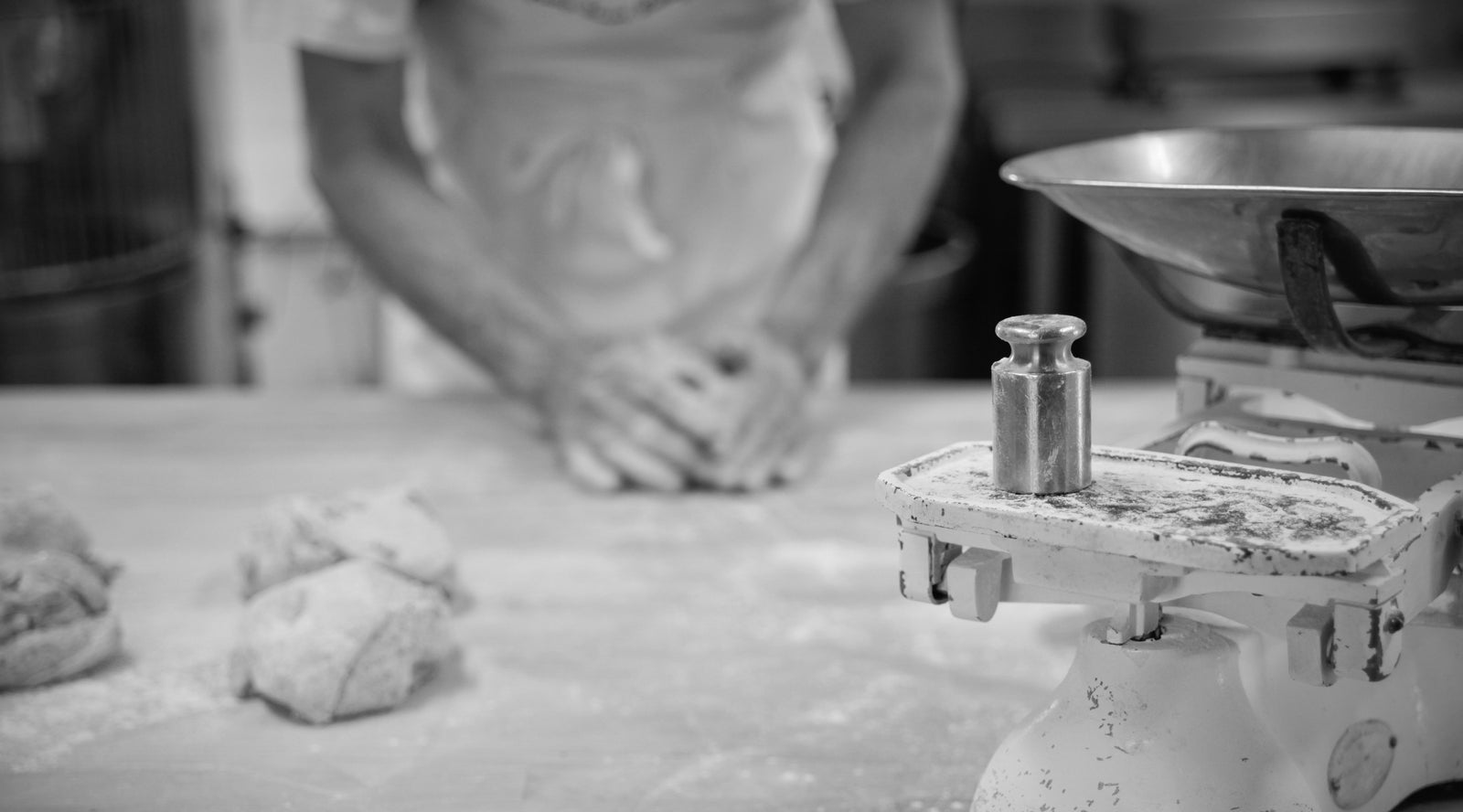FREE DELIVERY ON CHOCOLATE ORDERS OVER £35
FREE DELIVERY ON CHOCOLATE ORDERS OVER £35
SHOP CHOCOLATE
What is Sourdough?
by Joanna Brennan October 08, 2024 4 min read

What is Sourdough?
Well, first of all, sourdough isn’t a style, shape or flavour of bread. It is a process. A true sourdough is made using an inoculation of harvested wild yeasts and friendly bacteria. The dough is mixed and fermented over a number of hours to allow the living cultures to transform the mixture of flour, water and salt into a tangy, bubbly dough.
In the UK there is no legal definition of sourdough, despite the best efforts of Chris Young at The Real Bread Campaign. This means that anyone can market a loaf of bread as ‘sourdough’ without holding themselves to the same high standards that we do. We define sourdough as bread made without commercial yeast, fermented overnight, shaped by hand and never containing any dough improvers or conditioners. If you’re buying ‘sourdough’ with yeast, E-numbers and ascorbic acid in it - it isn't true sourdough.
Not all bread before the development of commercial yeast in the 1930’s was sourdough. It’s important to note that there has been a symbiotic relationship between bakers and brewers dating back to Egyptian times. The ‘balm’ or excessive yeasty broth produced during alcoholic fermentation was used to great effect by bakers to leaven bread in a speedier fashion than sourdough methods. Sourdough survived alongside the more commercial bread making industries - forever the preserve of the artisan and home baker.
Why does it take so long to make?
It is possible to make well risen bread using brewer’s yeast, the commercial strain named ‘saccharomyces cerevisiae’, that takes a fraction of the time it takes to make sourdough. The difference is that with sourdough bread, there are more complicated things taking place than just the production of gas from yeast spores.
Sourdough bread needs time to make chemical changes to the flour that transforms it from a calorific cluster of starch to a nutritional bounty. Flavour also develops in the this time, adding characteristic tang as well as rise to the loaf. It’s remarkable, and well worth the wait.

What makes sourdough special?
When we mix our sourdough a chain of reactions occur, many of which happen without any human control and can’t be cheated. There are two proteins in wheat flour that come together to form gluten which hold the gases produced when the wild yeasts multiply. These processes occur in yeasted breads too, but there are some really important changes that need time and the full force of natural fermentation to occur.
Sourdough typically has a moist, crumpet-like texture and will keep for a lot longer than a yeasted loaf. The crust is usually thicker and chewier, packed with umami flavour and sweetness. If the robust crust is a problem for you then look out for sourdough baked in a tin as it will have a thinner, softer crust.
Is sourdough really better for you?
It depends. We make beautiful sourdough panettone at Christmas and whilst delicious, it would be unhealthy to consume that much butter on a daily basis. On the contrary, our classic range of sourdough breads do provide a double-bill of flavour and nutrition. Our process allows for the ingredients to bloom and deliver their full nutritional potential. It all centres on the slow breaking down of an obstructive acid. So, how does fermentation increase the availability of nutrients in sourdough?
Phytic acid acts like a wall that reduces the bioavailability of the full nutritional package that many grains offer. This means that whilst the grains in our bread may contain certain elements, they are shielded from our digestive system and our bodies don't get the full benefit. On the bran of wheat there are good levels of phytase which breaks down the phytic acid, meaning that our guts can harvest the complete nutritional bounty from the sourdough bread. The phytase needs time to demolish the building blocks of the phytic acid and the slow fermentation of a true sourdough process allows this to happen.
Our sourdough gives you the full value of the expertly grown and milled wheat we use. The extended fermentation also allows the lactic acid bacteria to multiply, giving not just a delicious flavour but some other benefits besides. The acidic conditions enhance the keeping qualities of the bread and acts as a mould inhibitor, these acids also soften the gluten strands which helps alleviate the severity of gluten sensitivity in some people.
Our sourdough process takes three days from start to finish - a labour of love. Whilst we work hard on making it, we respect that the microbes in the dough work hard too. This cooperation between bakers and yeast culture is at the heart of sourdough bread making.
What is fermentation?
Fermentation is typically defined as the breakdown or changing of organic compounds, usually sugars, brought about by the introduction of enzymes. There are many kinds of fermentation, sourdough bread making is an example of collaborative fermentation with more than one kind of fermentation happening simultaneously. Within the sourdough process there is a concert of aceto-fermentation, lacto-fermentation and alcoholic fermentation.
It is this multi-faceted fermentation structure that makes sourdough so special - and so different from straight yeasted bread. We will go into this in more detail on our Workshop courses so if you are keen to know more - take a look at our ‘Understanding Sourdough’ course
Subscribe
Sign up to get the latest on sales, new releases and more …


